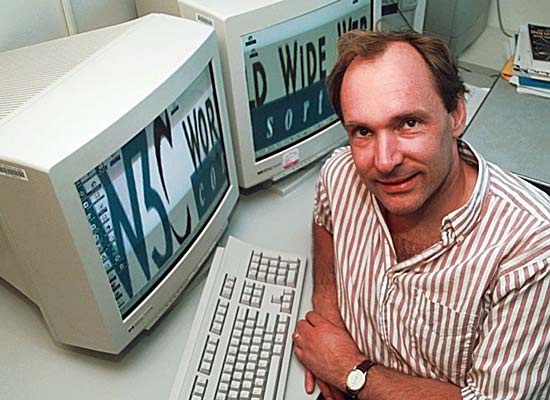
Modern people can't live a day without 'this'. What is ‘this’? It is the Internet. The person to introduce today is Tim Berners-Lee, a British computer scholar and father of the World Wide Web. He created the Internet by devising www, URL, and HTTP. And it is no exaggeration to say that if it had not been for Berners-Lee, Google, Naver, Kakao, and Facebook would never have appeared. Now he asked questions to the world. "Why did the Web become a tool for attacking women and girls?" Once again, Burners-Lee jumped on the front line to prevent the web from being used as a source of evil that creates inequality in the world. Let's now take a look at his life with the beginning of the Internet.
Tim Berners-Lee, a computer scholar born in Britain in 1955, first proposed the Web in 1989 when he was working for the European Organization for Nuclear Research (CERN). The Web, as we know, is a system that hyperlinked documents that have Web addresses (URL). He named his invention the "World Wide Web" - "www" for short. What is more surprising is that the invention was made available to everyone, despite the surrounding recommendations to protect it through patent rights. Perhaps it is thanks to such a decision by Berners-Lee that we can freely use the Internet and enjoy the convenience of constantly developing innovation. He was knighted in 2004"for services to the global development of the Internet", his contribution to popularizing the Internet.
Recently, however, Berners-Lee has been focusing on the Internet decentralization movement and the anti-Internet movement. This is because large IT companies make huge profitsby using voluntary information provided by users through numerous information leakage scandals and illegal information gathering events. However he is disappointed by the fact that companies are not taking responsibility when problems arise. Berners-Lee pointed out three major problems and criticized the Web for becoming a "monster" monopolized by several conglomerates. First, the loss of control of individuals' data / second, indiscriminate spread of fake news / third, a flood of non-transparent online advertising. In various interviews, Tim Berners-Lee expressed concern over the web's tarnished appearance, saying, "Although I have witnessed a wave of open data, I have not yet seen a wave of read-write data." In response, he announced the new project "Solid[1]" Platform, declaring in an interview with IT magazine Fastcompany in 2018. He declared "return control of data that is focused on big companies to individuals." It announced the war against those who use the Internet as "evil."
The Web may be like a sore finger that cannot be ignored to Tim Berners-Lee. This is because the original purpose of the web, which had been carefully raised, has been altered by a small number of large companies. Berners-Lee ruled out any commercial value when he created the Web 29 years ago. However, he even created a company called "Inrupts," which seems to be the beginning of a step to prevent the Web from flowing in the wrong direction. Can Berners-Lee really succeed in another 'Internet Revolution'? Given the current situation in which various Internet crimes are overflowing, it seems like a dream that is hard to achieve. However, Berners-Lee is expected to attain valuable achievements in reforming the Internet through innovation, not regulation.
[1]A platform that allows individuals to control themselves without handing over data to a giant platform like Google.
Choi Min-ju
cmj980522@cau.ac.kr

